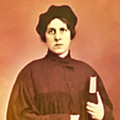References
- 1 2 3 4 Cohen, Diane (December 2009). "A Message of Progress". Northern Virginia Magazine. Archived from the original on 2013-10-19.
- 1 2 Spark Experience. "A Taste of Brazil Flavors Passover". Jewish Food Experience.
- 1 2 3 "Rabbi". etzhayim. Archived from the original on 2013-10-19.
- ↑ "Spring 2012 Letters". cjvoices.org. Archived from the original on September 27, 2013.
- ↑ "About Us". Eitz Chayim. Retrieved 9 September 2022.
- ↑ "Founder & Spiritual Leader". Jewish Institute for Lifelong Learning & Innovation. Retrieved 9 September 2022.
